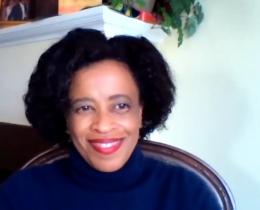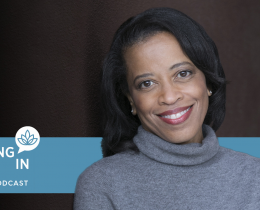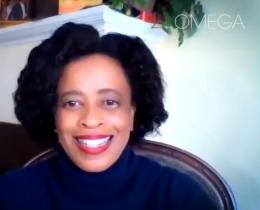Bridging the worlds of spirituality and activism, Radical Dharma Camp is a weekend gathering held at Omega that examines systemic suffering and racial injustice while encouraging participants to stay in presence.
Rev. angel Kyodo williams, along with guest teacher Jasmine Syedullah, helps students navigate grief, apathy, alienation, and burnout, and engage in an intimate practice of bold, authentic, and inclusive conversation.
Two scholarship participants from 2017—Kendra Graves and Jessica Angima—say that their time spent at the retreat benefited both their life and work while offering them a chance to slow down and feel more connected to themselves and their causes.
Kendra Graves: Continuing the Fight for Social Justice
Before attending Radical Dharma Camp, Graves was focused on family and had moved back to her hometown to live with her parents. She was also transitioning her son into homeschooling so they could spend more time together and ease her concerns with public and charter school education. Six months before camp, her mother passed away, and she and her family were in the process of grieving that loss.
In her career Graves has worked as an educator and organizer with communities of color fighting for racial, economic, gender, and environmental justice. She spent years as a communications professional, writing and producing media to share stories of resistance and resilience through collaborations with nonprofit organizations, independent artists, and small businesses.
One highlight for her at Camp was the focus on self-inquiry and having more time to deepen her own practice.
“Making time and space to be with myself has been absolutely essential to my capacity to continue working for racial justice,” she said. “As a yogi, I practice to bring the yama of svadhyaya (self-study) into my work/life, and I was impressed by the ways the teachers facilitated dialogue in a way that helped me go within while also recognizing the interconnectedness of my internal environment with the beings and world around me.”
Graves also appreciated the safe space to discuss difficult topics. “I was glad to be in a space where white people challenged themselves and each other to face the effects that racial oppression has had on people of color as well as in their own families, communities, and spiritual life,” she said.
She felt a great connection with the teachers and received new insights for moving forward, too.
“As a Black woman, I greatly enjoyed learning from queer Black teachers about how to embody the radical truth of who I am, even as my identity has been made to make me suffer,” she said. “As I heal through my meditation practice, I understand the right actions I must take to end suffering in myself and others.”
Since the retreat, she and her son relocated to Portland, Oregon. She was accepted to a 10-month beginning farmers training program for people of color lead by a Black-owned farm, Mudbone Grown, and Oregon Food Bank.
“I hope to continue teaching yoga and community organizing here in Portland, as I learn how to develop farm-based social enterprises to support communities of color in achieving food justice and sovereignty,” Graves said.
She has also met several homeschooling families of color and is looking forward to building community with them.
Jessica Angima: Using Mindfulness to Liberate People of Color
Angima works as an assistant studio manager at MNDFL, a New York City-based meditation studio, and as a fellowship program assistant at BRIC, the largest presenter of free cultural programming in Brooklyn. Additionally, she’s a certified meditation instructor and co-leads MNDFL's monthly People of Color Sit and Discussion group.
She says she is inspired by the dharma teachers who have done the groundwork to bring the liberation of people of color to the forefront and stays motivated through daily meditation practice and attending silent meditation retreats. In particular, she welcomes the opportunity to recharge at weeklong silent retreats.
One of her major takeaways from Radical Dharma Camp was this: “The idea that in the journey for self-liberation and undoing injustices there is no end-point to reach,” she said. “We do not need to be attached to a certain outcome of our actions.”
She also said she learned new tools for dealing with the 24/7 news cycle and developing a new relationship with stillness.
Since the retreat, she has continued teaching guided meditation at MNDFL and other locations throughout New York City and is seeking opportunities to merge her work in meditation with her work in the arts and to incorporate social justice initiatives.
Her advice to others who would like to get more involved helping to heal racial injustice is simple: “Take care of yourself first and foremost. One of the first things we discussed during the retreat is to discover what it is that we need to leave behind to move toward our personal liberation and onward to our collective liberation.”



